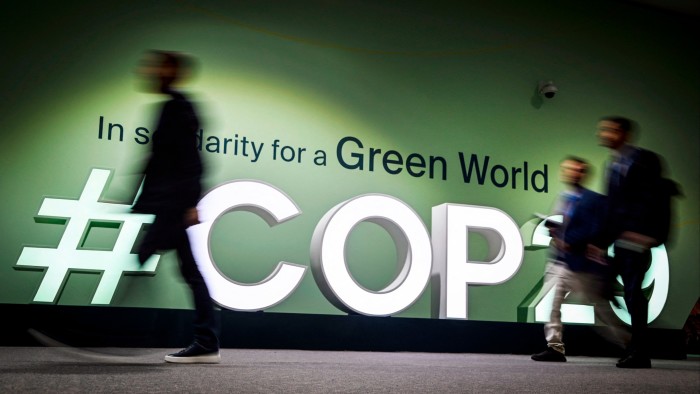Unlock the White House Watch newsletter for free
Your guide to what the 2024 US election means for Washington and the world
The annual UN climate COP conference has begun in Azerbaijan’s capital of Baku beneath a menacing cloud. Once again, the world’s richest country will be led by a leader actively opposed to fixing one of the world’s most intractable and existential problems.
Global efforts to rein in planet-warming emissions have never proceeded as smoothly or effectively as needed, ever since they began three decades ago. But Donald Trump’s return to the White House comes at an especially fraught moment for a green energy transition that is still closer to the starting blocks than the finishing line.
Another spate of exceptional heat means 2024 is on track to replace 2023 as the warmest year on record. The greenhouse gas emissions fuelling the heat that countries are supposed to be slashing instead grew to a record high last year, while weather extremes are battering cities across the globe with remorseless regularity. It is no time for the US, the second-biggest emitter after China, to be missing in action.
This time around, a Trump administration emboldened by last week’s emphatic election vote may wreak more economic harm at home than abroad, especially if the Republican party ends up controlling both chambers of Congress. During Trump’s first term in office from 2017 to 2021, China began to leap ahead of the US in electric vehicles, batteries, solar modules and other clean energy technologies.
The Biden administration fought back with the 2022 Inflation Reduction Act, the landmark climate law funnelling billions of dollars into green industries that Trump has vowed to gut. Control of Congress may help him do this, though Republican districts have been big recipients of the act’s green largesse. Either way, his threats to end clean power projects such as offshore wind farms “on day one”, while boosting fossil fuel production, will inject uncertainty into green investment plans, and set back hopes of breaking China’s grip on the technologies of the 21st century.
It is true the economic case for ever cheaper renewables has strengthened since Trump’s first term. The world now invests nearly twice as much in clean energy as in fossil fuels. But China dominates that investment, especially outside the US and EU, and Trump may embolden other leaders to take their feet off the pedal in a green energy race that the Inflation Reduction Act had begun to accelerate abroad.
An early test of how the election result will reverberate will come in Baku. Trump’s campaign team has said he will again pull the US out of the 2015 Paris Agreement, which he announced in 2017 and formally did in late 2020, only to watch Joe Biden restore membership in early 2021.
No country followed the US out then and there is no sign of any exodus forming now, so far. But Trump advisers hope the incoming president will this time pull the US out of the Paris Agreement’s parent treaty, the 1992 UN Framework Convention on Climate Change — a harder to reverse step that would deal a much deeper blow to international collaboration. That prospect is expected to taint a central task in Baku, where envoys are due to agree a new finance goal to help poorer countries deal with a hotter climate.
Wealthy nations struggled to meet on time an earlier target of $100bn a year first formally agreed in 2010. Negotiating a larger goal on the eve of a potential US Paris pullout is a steep ask. Ultimately, Trump is unlikely to kill off the COP process nor bring the energy transition to a halt. But the EU and China must be ready to help fill a US void. Further delay in a climate shift that is already going at a dangerously glacial pace is something the world cannot afford.
Read the full article here

